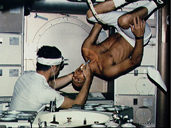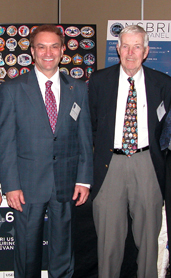Dr. Joseph P. Kerwin is a recipient of an honorary degree from Baylor College of Medicine (BCM) for his "influential contributions to space biomedical research and space medicine." Kerwin, a former NASA astronaut, made history on May 25, 1973, as the first U.S. medical doctor to travel in space when the Skylab 2 crew launched. He spent 28 days in orbit as a member of the first crew to live aboard the Skylab space station.
Currently, Kerwin is a member of the National Space Biomedical Research Institute’s (NSBRI) User Panel. The User Panel is a group of former and current astronauts and flight surgeons who assist NSBRI management, which is based at BCM, in determining high-yield research areas that will lead to effective strategies that enhance mission success and maintain or improve crew health. He also serves as Director Emeritus on NSBRI’s Board of Directors and is a member of BCM’s Center for Space Medicine.
"Throughout his career, Dr. Kerwin has been at the forefront of space medicine and biomedical research," said Dr. Jeffrey P. Sutton, NSBRI director. "Today, he continues to have an active role at NSBRI, where his medical background and long-duration spaceflight experiences are valuable in the Institute’s efforts to protect astronaut health and improve health care on Earth."
Kerwin received the Doctor of Letters in Medicine degree Tuesday during BCM’s graduation ceremony. Kerwin shared some space medicine insights after the ceremony. "Exploration medicine is understanding and dealing with normal humans in abnormal environments, and space medicine deals with the most challenging environment that any frontier presents," Kerwin said. "Our job is to understand it — and ourselves more deeply — and to protect our explorers from its threats.
"Deep space expeditions and landings on Mars and some of the moons of the giant planets, are in store. And perhaps some day, we will learn to do two things that seem impossible today: to build permanent habitations on another planet and to send humans beyond the solar system. Problems and opportunities abound."
Kerwin received his medical degree from Northwestern University Medical School in Chicago and was a U.S. Navy flight surgeon. NASA selected Kerwin as a scientist-astronaut in 1965. While an astronaut, Kerwin served as a CAPCOM during Apollo 13. Following Skylab 2, he served in several positions, including Director, Space and Life Sciences at Johnson Space Center (JSC), where he was responsible for direction and coordination of medical support for operational human spacecraft programs and managing JSC’s Earth sciences and scientific efforts in lunar and planetary research.
He retired from NASA and the Navy in 1987 to go to work for Lockheed Corporation as manager of the Extravehicular Systems Project. He became president of the Life Sciences Special Business Unit of Wyle Laboratories (formerly KRUG) in 1997, a position he held until 2004. Kerwin is also a Fellow of the Aerospace Medical Association and a member of the Aircraft Owners and Pilots Association.
NSBRI, funded by NASA, is a consortium of institutions studying the health risks related to long-duration spaceflight and developing the medical technologies needed for long missions. NSBRI’s science, technology and education projects take place at more than 60 institutions across the United States. In addition to protecting astronaut health, NSBRI research has benefits for health care on Earth.
The BCM Doctor of Letters in Medicine is awarded to physicians who have excelled in medicine through teaching, research or public service and whose acts have brought credit or advancement to BCM or to the profession of academic medicine.
-end-
Brad Thomas
NSBRI
713-798-7595
rbthomas@bcm.edu
Note:
For more information about Dr. Joseph P. Kerwin, please visit http://www.jsc.nasa.gov/Bios/htmlbios/kerwin-jp.html.







